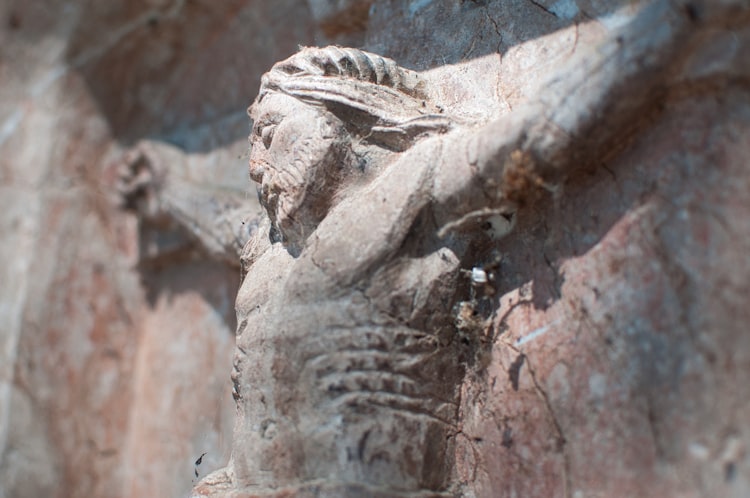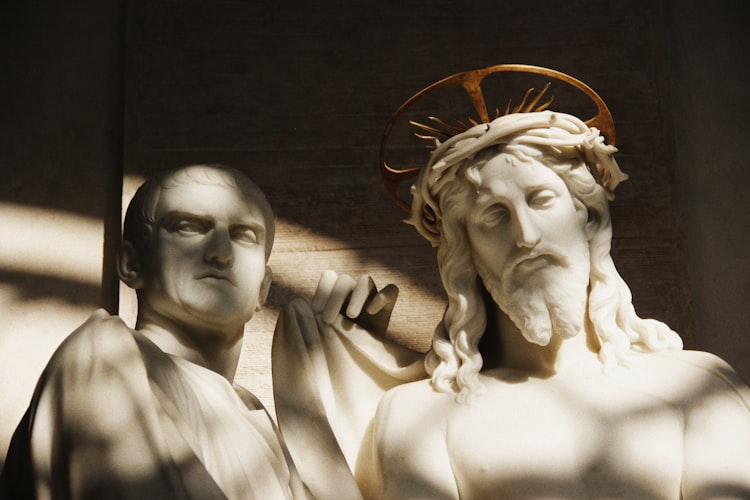Firm Foundation: Part 13

Born of the Virgin Mary
“…Who was conceived by the Holy Spirit, born of the virgin Mary…”
This short phrase encapsulates the doctrine we call “the Incarnation,” which means (as we’ve discussed) Jesus Christ was both fully God and fully man. The second person of the Triune Godhead, the eternally begotten Son, inhabited flesh. He was God incarnate—God in the flesh.
The Apostles’ Creed doesn’t attempt to explain the logic of this mind-boggling truth, but simply affirms it by reminding us that Jesus had no earthly biological father. The Virgin Mary’s pregnancy was accomplished through the power of the Holy Spirit, the promise of which was chronicled in Luke 1:35.
“the Holy Spirit will come upon you, and the power of the Most High will overshadow you” (Luke 1:35).
The Jesus was a historical man is beyond (nearly) all doubt. His existence is attested to by ancient historians both religious and secular. Jesus’ humanity is not typically the objection people have to the claims of Christian theology. It is not his birth to a young woman named Mary that so many reject. No, instead, it is Jesus’ divinity that raises the eyebrows and prompts the challenges. But the Scriptures reference the deity of Christ in numerous places
"who, though he was in the form of God, did not count equality with God a thing to be grasped..." (Phil 2:6)
"He is the image of the invisible God, the firstborn of all creation." (Col 1:15)
"But false prophets also arose among the people, just as there will be false teachers among you, who will secretly bring in destructive heresies, even denying the Master who bought them, bringing upon themselves swift destruction." (2 Peter 2:1)
"Pay careful attention to yourselves and to all the flock, in which the Holy Spirit has made you overseers, to care for the church of God, which he obtained with his own blood." (Acts 20:28)
"I and the Father are one.” The Jews picked up stones again to stone him. Jesus answered them, “I have shown you many good works from the Father; for which of them are you going to stone me?” The Jews answered him, “It is not for a good work that we are going to stone you but for blasphemy, because you, being a man, make yourself God.” (John 10:30-33)
Unfortunately, the virgin birth of Jesus seems to us an ancient myth, one that the ancients found easier to believe than we do today. After all, we understand the science of conception, fetal development and birth as scientifically proven needing a human seed fertilizing a human egg. Yet, we dare to believe that Jesus was born of a virgin without the help of a human seed to fertilize her human egg. To understand the virgin birth, we need to see how it fits into the whole story of Scripture—a story in which miraculous births play a starring role.
Many skeptics today will counter that “virgin” in the biblical and historical sense may refer simply to a young girl of marry-able age. This is no doubt true. But this is not the sense with which the biblical authors understood “virgin” to mean. Even if Isaiah could not have foreseen the full import of his own Spirit-breathed prophecy.
"Therefore the Lord himself will give you a sign. Behold, the virgin shall conceive and bear a son, and shall call his name Immanuel." (Is 7:14)
Matthew’s Gospel gives us the fullness of meaning: “[Joseph] knew her not until she had given birth to a son.”
The reality is this: only man should pay the price for the sins of mankind, but only God could pay the price for the sins of mankind. Thus, in Jesus Christ, the “man should” and the “God could” unite in perfect payment and pure pardon.
Israel’s story begins with a promise to Abraham and Sarah (see Genesis 12-17). A couple who cannot conceive are chosen by God and told that they will have a great family. Sarah laughs at the promise (so would we under the same circumstances). Later, however, when she has given birth in her grand old age, the child is named Laughter (Hebrew: Isaac) because of the astonished joy of his parents. Sarah can hardly believe her own body: and yet it’s true. She has given birth to the promise.
The next great turning point in Israel’s story is the arrival of Moses (Exodus 2:1-10). Although Moses’ conception is not a miracle, his infancy is marked by a miraculous escape from danger. He is snatched away from the murdering hand of Pharaoh. He is placed in a basket and set adrift on the river, where he is found and adopted by a member of the royal household, an Egyptian princess who then appoints the baby’s biological mother to be his nursing maid. The whole story portrays an amazing providential design by which Moses is spared and, as it were, smuggled right into the heart of Egyptian power. All this is meant to anticipate the great miracle to come when God will deliver the people of Israel from slavery.
When Israel has come to the promised land, before the establishment of the monarchy, God raises up judges to lead the people. The greatest of the judges is Samson, and his story begins with another miraculous birth (Judges 13:1-25). Samson’s mother is unable to conceive. But she is visited by an angel who tells her that she will give birth to a savior who will triumph over the Philistines.
After the age of the judges comes the age of the prophets and kings. It begins with Hannah, a woman full of grief because she cannot bear children (1 Sam 1:1-20). In answer to her prayer, Hannah becomes miraculously pregnant and her child Samuel becomes the prophet who will anoint the first kings of Israel. With the miraculous birth of Samuel the whole line of Hebrew prophets comes into being.
That’s how it goes in the Old Testament: at the great turning points of history, we find a woman, pregnant, and an infant child brought into the world by the powerful promise of God. Israel’s story is a story of miraculous births.
Later, the people of Israel were taken from the promised land and led away into Babylonian captivity. It was the darkest hour of their history. Out of the depths of despair, the promise of God was heard again through the prophet Isaiah. The prophet compared the coming deliverance to the joy of a miraculous pregnancy:
Sing, O barren one who did not bear;
burst into song and shout,
you who have not been in labor!
For the children of the desolate woman will be more
than the children of her that is married, says the Lord.
Enlarge the site of your tent,
and let the curtains of your habitations be stretched out;
do not hold back; lengthen your cords
and strengthen your stakes.
For you will spread out to the right and to the left,
and your descendants will possess the nations
and will settle the desolate towns…
All your children shall be taught by the Lord,
and great shall be the prosperity of your children.
(Isaiah 54:1-3,13)
It is as if Israel, in her exile, has been a poor woman in a small tent with room for only one. But now it’s time to make alterations on her home, to prepare the space for a bustling family. The one who has never been in labor is about to give birth. That is what the promise of God looks like.
God’s overarching plan is to bring blessing to all the nations through the descendants of Abraham. If ever the Hebrew women ceased to bear children, the promise would have failed: the whole world would be lost. Pregnancy and childbirth are the means by which God’s promise makes its way through the crooked course of history. Every newborn child is a reminder of the promise. Every male child was physically marked by circumcision: a potent reminder that their bodies were not merely their own but had been scripted into a bigger story.
Against this backdrop it should come as no surprise to find Israel’s Messiah entering the world by means of a miraculous pregnancy. In the Gospel of Luke, the first character we meet is another faithful Jewish woman who can’t conceive: Elizabeth. Like Samson’s mother, Elizabeth was promised that she will bear a child (Luke 1:5-25).
After Elizabeth has become pregnant, we meet her cousin Mary. An angel tells Mary that she too will miraculously conceive and that her child will be the fulfillment of all God’s promises to Israel. Mary responds with simple trust and gladness. The joy of her Magnificat (Luke 1:46-55) is the same joy that made Sarah laugh when she gave birth to Isaac. It is the same joy that wiped away Hannah’s tears when she gave birth to Samuel. Israel’s joy, the joy of God’s promise, the joy of salvation—is all summed up in that startling experience of the birth of a miraculous child.
The confession that Jesus Christ was born of a virgin isn’t just a bit of theological eccentricity. It’s not a random miracle story. It’s a reminder that our faith has deep roots in Israel’s story and Israel’s Scriptures. The coming of the Savior wasn’t just a new thing. It was the culmination of the whole great story of God’s loving faithfulness to the people of Israel. When we confess that Jesus is “born of the Virgin Mary,” we see him silhouetted against the backdrop of God’s promise to Abraham, the exodus from Egypt, the rule of the judges, the coming of the prophets, and the promised deliverance form exile.
The meaning of history is not power and empire, but promise and trust. The secret of history is revealed when a woman, insignificant to the eyes of the world, responds in joy to God’s promise and bears that promise into the world in her own body.
The biblical evidence for Jesus’ deity is abundant. That many Jews in the first century began to worship him as God ought to give us even more indication that the evidence of his divinity was felt to be quite strong, even overwhelming. But that has not stopped challenges throughout the centuries.
We will stand on this confession because we know that it is integral to Christ’s gospel. To deny that Jesus was either fully God or fully man is to deny the salvation that Jesus the God-Man has purchased. [Quoted from Ben Myers’ book, “The Apostle’s Creed: A Guide to the Ancient Catechism, pp 50-54.]
The Incarnation, the Virgin Birth, and Peter’s hell-conquering confession that Jesus is “the Christ, the Son of the living God” (Matt 16:16) are all crucial to the good news of forgiveness of sins and the gift of eternal life.
The Apostle’s Creed offers some general guidelines for the faithful reading of the Gospels without including all the details of the Gospels. The Creed is only meant to remind us of the larger narrative and to focus our attention on Jesus’ identity as divine and human, the Son of God and Mary’s son, fulfilling Messianic prophecy.






Member discussion